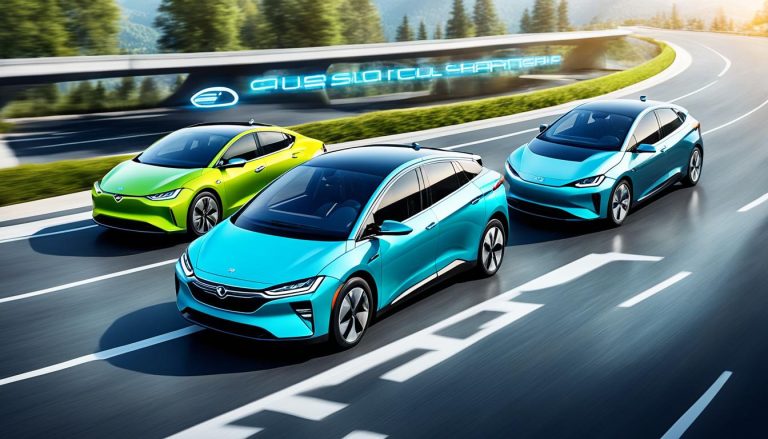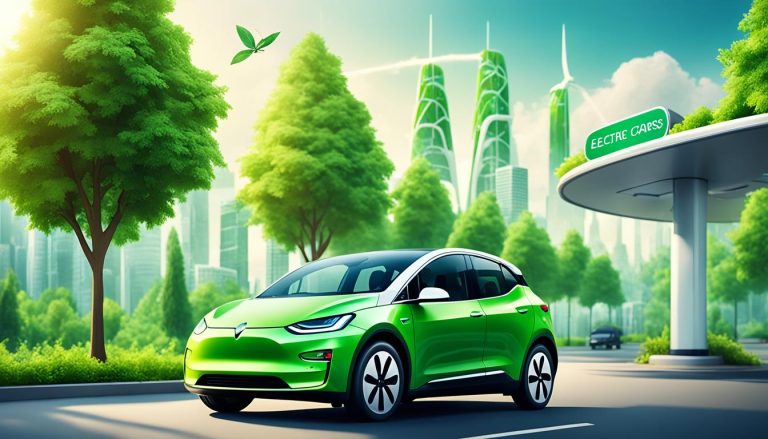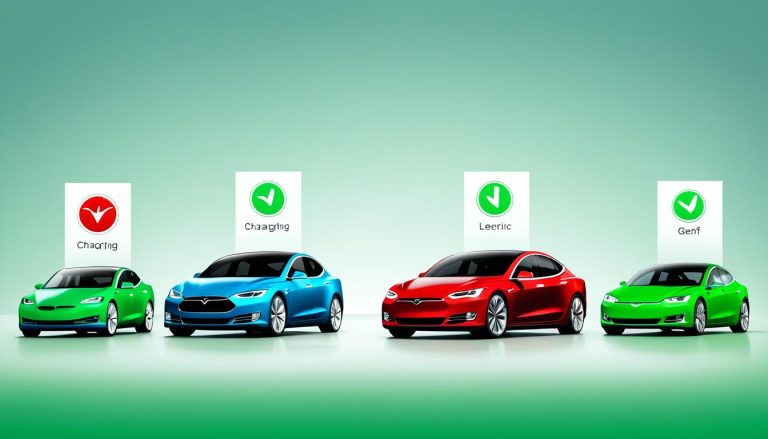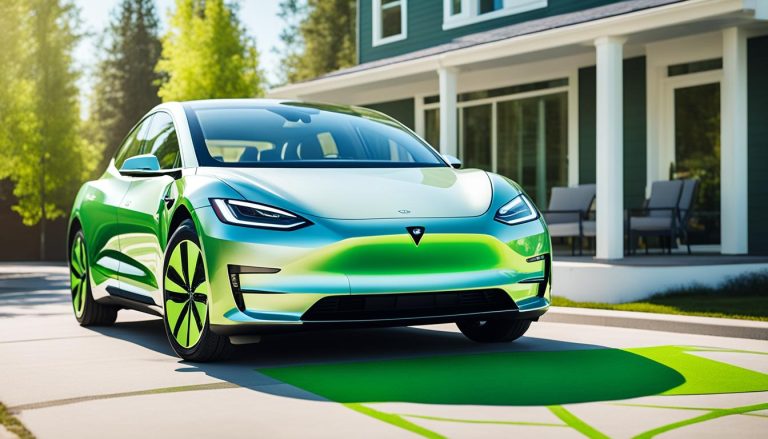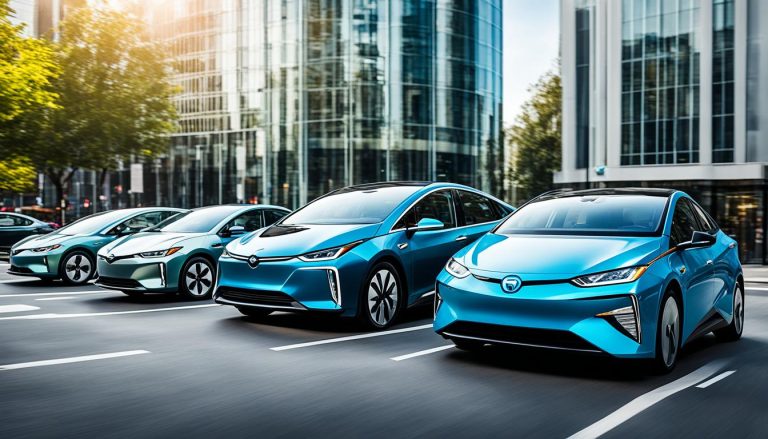How Do Hybrid Electric Vehicles Work
Welcome to our comprehensive guide on hybrid electric vehicles and how they work. If you’re curious about these environmentally friendly vehicles and their unique mechanics, you’ve come to the right place. We’ll take you through the inner workings of hybrid electric vehicles, shedding light on the technology that powers them and the benefits they offer. So, let’s dive in and explore the fascinating world of hybrid electric vehicles.
Understanding Hybrid Electric Vehicle Technology
In this section, we will take a closer look at the various technologies that power hybrid electric vehicles. By combining an internal combustion engine with an electric motor, hybrid electric vehicle technology brings together the best of both worlds – the efficiency of an electric motor and the range of a traditional engine.
The hybrid battery plays a crucial role in this technology. It stores the electrical energy generated during operation and powers the electric motor when needed. This allows for reduced fuel consumption and lower emissions, making hybrid electric vehicles more environmentally friendly.
One of the key features of hybrid electric vehicle technology is the ability to seamlessly switch between the internal combustion engine and the electric motor. This intelligent control system ensures optimal power distribution based on driving conditions, speed, and acceleration. As a result, hybrid electric vehicles can adapt to various situations, providing an efficient and smooth driving experience.
Regenerative braking is another essential aspect of hybrid electric vehicle technology. When the brakes are applied, the electric motor acts as a generator and converts the kinetic energy of the vehicle into electricity. This electricity is then stored in the hybrid battery, effectively recharging it. Regenerative braking not only improves the overall efficiency of the vehicle but also extends the battery life.
To illustrate the components and workings of hybrid electric vehicle technology, let’s take a closer look at the following table:
| Components | Description |
|---|---|
| Internal Combustion Engine | Runs on gasoline or other liquid fuel and provides power for the vehicle. |
| Electric Motor | Runs on electricity supplied by the hybrid battery and assists the engine during acceleration. |
| Hybrid Battery | Stores electrical energy and powers the electric motor. |
| Intelligent Control System | Manages the switching between the engine and the electric motor for optimal efficiency. |
| Regenerative Braking | Converts kinetic energy into electricity to recharge the hybrid battery. |
By understanding the technology behind hybrid electric vehicles, we gain insights into how these vehicles operate with improved efficiency and reduced environmental impact. The integration of an internal combustion engine, electric motor, hybrid battery, and intelligent control system enables an intelligent balance between power and sustainability.
How Does the Hybrid System Switch Between Power Sources
In hybrid electric vehicles, the intelligent control system plays a crucial role in seamlessly switching between the internal combustion engine and the electric motor. This system is designed to optimize the use of power sources based on various factors, including driving conditions, speed, and acceleration.
By constantly monitoring these variables, the hybrid system determines the most efficient combination of power sources to ensure optimal performance while minimizing fuel consumption and emissions. When the vehicle requires additional power for acceleration or climbing steep inclines, the hybrid system activates the internal combustion engine to provide the necessary boost. Conversely, during low-speed driving or stop-and-go traffic, the system switches to the electric motor to maximize fuel efficiency and reduce emissions.
One of the innovative features of hybrid electric vehicles is the start-stop technology. When the vehicle comes to a stop, such as at traffic lights or in heavy traffic, the system temporarily shuts off the internal combustion engine. This not only conserves fuel but also reduces idling emissions. When the driver releases the brake or accelerates, the system quickly restarts the engine, ensuring a smooth and seamless transition between power sources.
The intelligent control system of hybrid electric vehicles has been engineered to provide a seamless driving experience while capitalizing on the benefits of both the internal combustion engine and the electric motor. This advanced technology showcases the ingenuity behind hybrid systems, delivering a harmonious blend of power and efficiency.
Benefits of Hybrid System Switching:
- Optimized power usage based on driving conditions
- Reduced fuel consumption and emissions
- Seamless transition between power sources
- Improved fuel efficiency in stop-and-go traffic
- Enhanced performance during acceleration and inclines

| Power Source | Advantages |
|---|---|
| Internal Combustion Engine | – High power output – Ideal for high-speed driving – Quick acceleration |
| Electric Motor | – Instant torque – Enhanced fuel efficiency – Reduced emissions – Quieter operation |
The Benefits of Hybrid Electric Vehicle Technology
Hybrid electric vehicle technology offers numerous benefits that contribute to a greener and more sustainable future. These vehicles are designed to reduce fuel consumption, emissions, and dependence on fossil fuels, making them an eco-friendly option for conscientious drivers.
One of the key advantages of hybrid electric vehicle technology is its ability to significantly improve fuel efficiency. By combining an internal combustion engine with an electric motor, these vehicles can optimize power usage and minimize fuel consumption during various driving conditions. This not only helps drivers save money on fuel costs in the long run but also reduces the overall carbon footprint.
“Hybrid electric vehicles are a game-changer for the environment. They provide a practical and efficient solution to reduce pollution and combat climate change.” – Lisa Thompson, Environmental Scientist
In addition to fuel efficiency, hybrid electric vehicles also emit fewer pollutants compared to traditional vehicles. The combination of an electric motor and advanced emissions control systems helps reduce harmful exhaust emissions, such as nitrogen oxides and particulate matter. This has a positive impact on air quality, leading to healthier communities and a cleaner environment.
Moreover, the reduced dependence on fossil fuels is another significant benefit of hybrid electric vehicle technology. By supplementing the internal combustion engine with an electric motor, these vehicles rely less on gasoline or diesel as their primary source of power. This not only helps to conserve finite fossil fuel resources but also promotes energy diversity and resilience.
Furthermore, owning a hybrid electric vehicle can come with potential cost savings and incentives. Many countries and municipalities offer financial incentives such as tax credits, rebates, and reduced registration fees to encourage the adoption of eco-friendly vehicles. Additionally, the overall maintenance and operating costs of hybrid electric vehicles tend to be lower than those of traditional vehicles, thanks to their advanced technology and improved fuel efficiency.
As the benefits of hybrid electric vehicle technology continue to become more evident, these vehicles are gaining popularity among environmentally conscious consumers. They offer a practical and sustainable transportation option that aligns with global efforts to reduce greenhouse gas emissions and combat climate change.
With the combination of fuel efficiency, reduced emissions, decreased dependence on fossil fuels, and potential cost savings, hybrid electric vehicles are paving the way for a cleaner, greener, and more sustainable future.
The benefits of hybrid electric vehicle technology at a glance:
| Benefits | Description |
|---|---|
| Fuel Efficiency | Optimized power usage and minimized fuel consumption |
| Reduced Emissions | Lower levels of harmful exhaust emissions |
| Reduced Dependence on Fossil Fuels | Less reliance on finite fossil fuel resources |
| Cost Savings and Incentives | Potential financial incentives and lower maintenance costs |
With their numerous advantages, hybrid electric vehicles are playing a crucial role in creating a sustainable transportation landscape and building a cleaner future for generations to come.
The Future of Hybrid Electric Vehicles
As we look ahead, the future of hybrid electric vehicles promises exciting advancements in technology that will further enhance efficiency and performance.
Ongoing research and development efforts in the automotive industry are focused on refining and optimizing hybrid systems to deliver even better fuel economy and reduced emissions. Manufacturers are exploring innovative designs and materials to make vehicles lighter, enhancing overall energy efficiency and range.
One key area of future development is the emergence of plug-in hybrid electric vehicles (PHEVs), which offer the convenience of electric charging with the extended range provided by an internal combustion engine. PHEVs allow drivers to rely more on electric power for shorter trips, minimizing fuel consumption and emissions. This technology is expected to gain traction as charging infrastructure continues to expand and battery technology improves.
Furthermore, the integration of renewable energy sources in hybrid systems holds immense promise for the future. By harnessing solar or wind power to charge hybrid vehicle batteries, the overall environmental impact can be further reduced, enhancing the sustainability of these vehicles. This integration of renewable energy will contribute to a more sustainable and greener transportation landscape.
The future of hybrid electric vehicles is not limited to personal transportation. Commercial vehicles, such as buses and delivery trucks, are also expected to adopt hybrid technology, leading to significant reductions in fuel consumption and emissions on a larger scale.
The Potential Advantages of Future Hybrid Electric Vehicles:
- Greater fuel efficiency and reduced emissions
- Longer electric-only range for plug-in hybrids
- Increased integration of renewable energy sources
- Expanded charging infrastructure for electric vehicles
- Continued advancements in battery technology
- Improved range and performance of hybrid systems
As technology evolves and research continues to push the boundaries of hybrid electric vehicle innovation, the future holds immense potential for sustainable transportation that reduces our carbon footprint and dependence on fossil fuels.
With ongoing efforts towards achieving a more sustainable future, the hybrid electric vehicle industry is poised to play a significant role in revolutionizing the way we move. These vehicles offer a viable solution to address environmental concerns while providing the comfort, efficiency, and performance that consumers expect.
As we embrace the future of hybrid electric vehicles, it is clear that sustainable transportation is no longer a distant vision but a tangible reality that is within our grasp.
Conclusion
In conclusion, hybrid electric vehicles offer a compelling solution to address the environmental challenges posed by traditional vehicles. By combining the best features of internal combustion engines and electric motors, these vehicles provide increased efficiency, reduced emissions, and a more sustainable mode of transportation. The continuous advancements in hybrid electric vehicle technology promise even greater benefits and a brighter future for eco-friendly transport.


